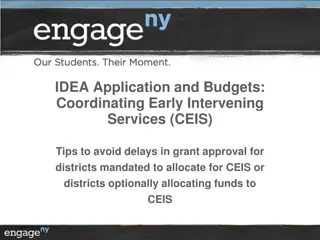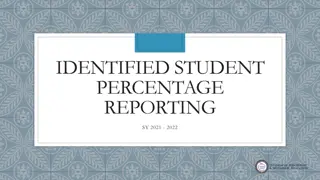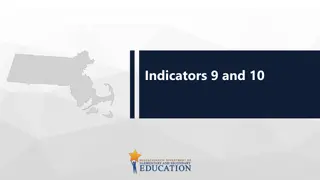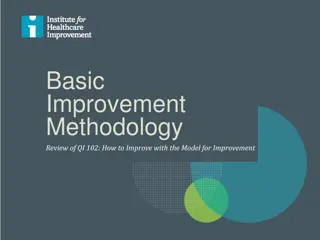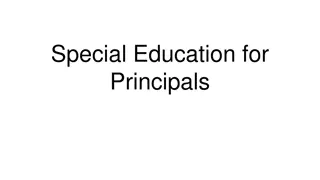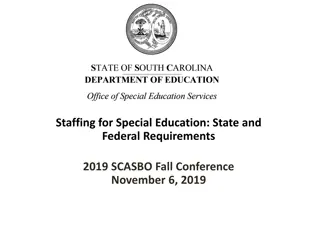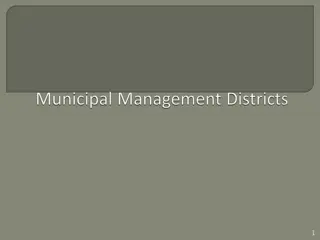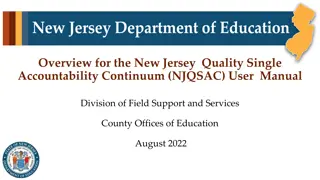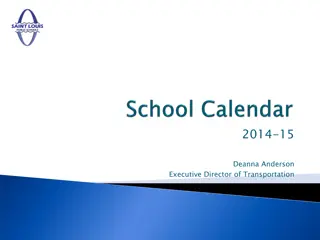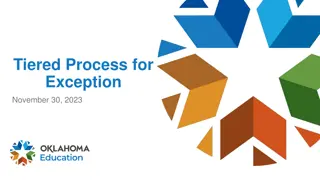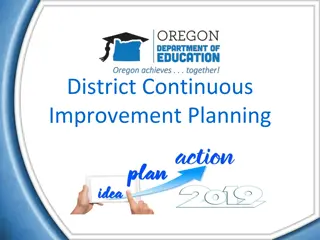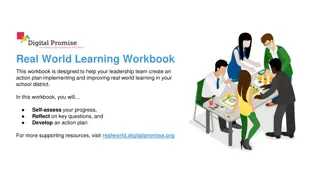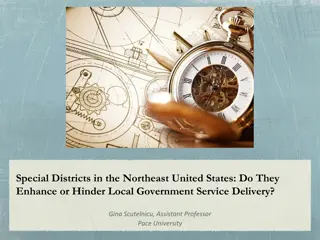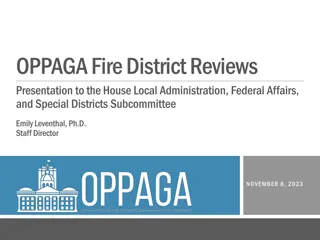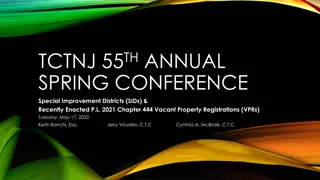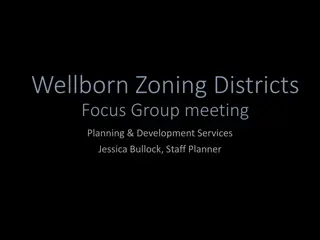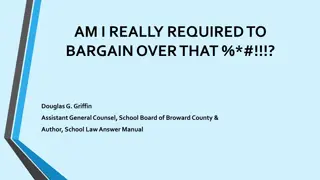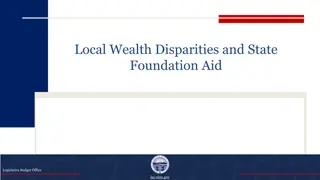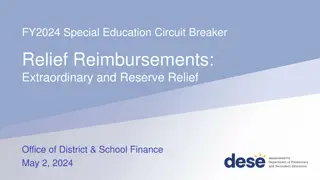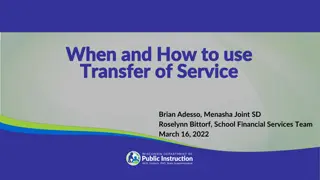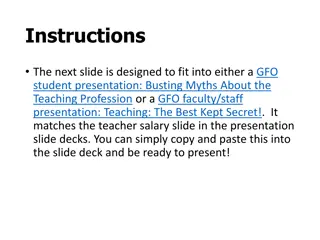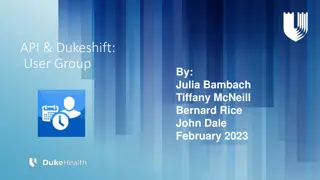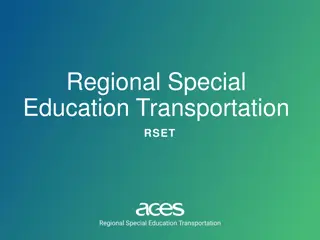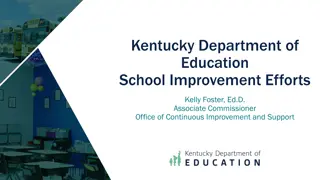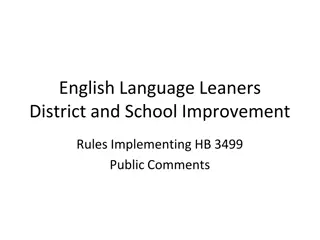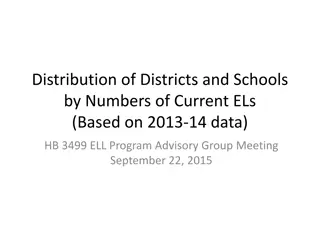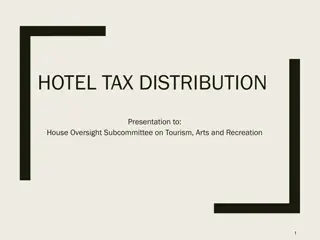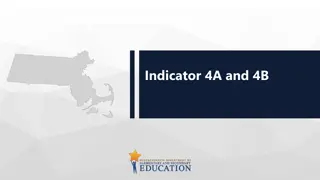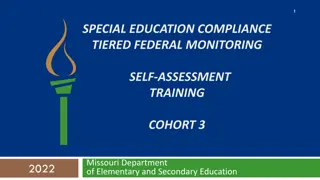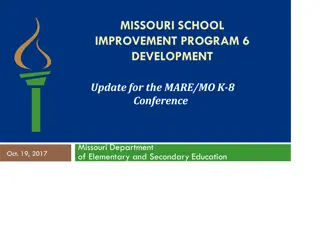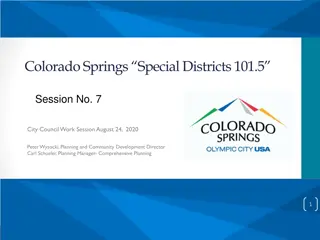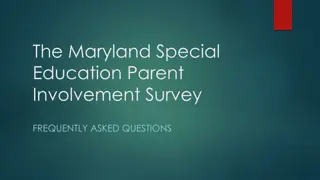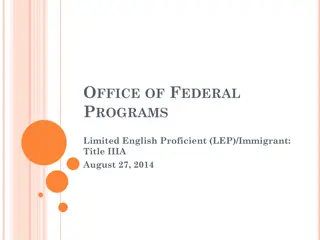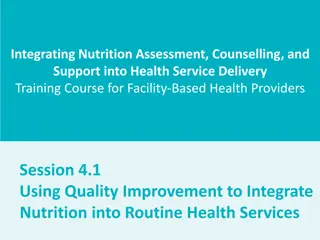Special Education Circuit Breaker Program Overview FY2024
The Special Education Circuit Breaker Program for FY2024 provides financial assistance to public school districts for high-cost special education services. The program includes Relief Claims and Year-End Claims cycles, with legal references for reimbursement guidelines. Reserve Relief funds are avai
1 views • 27 slides
Comprehensive Overview of Ohio's 2023 Special Education Ratings
Ohio's 2023 Special Education Ratings assess the performance of local districts in implementing IDEA requirements, with categories ranging from Meets Requirements to Needs Substantial Intervention. The ratings, based on compliance data from the previous school year, include indicators such as timely
1 views • 21 slides
Coordinating Early Intervening Services (CEIS) in IDEA Applications: Tips for Efficient Grant Approval
Coordinated Early Intervening Services (CEIS) under IDEA address disproportionality in school districts by providing academic and behavioral support to K-12 students not identified for special education. Districts allocate 15% of their IDEA funds to CEIS if significant disparities in identification
0 views • 10 slides
Identifying Student Percentage Reporting SY 2021 - 2022
Identified Student Percentage Reporting (ISP) is essential for districts to report the number of students identified through direct certification and categorical lists in eSchool. This report must be submitted by April 15, 2022, to comply with federal regulations. Understanding how ISP is calculated
1 views • 12 slides
Analysis of Indicators 9 & 10 in Special Education Representation
The indicators 9 and 10 focus on the disproportionate representation of racial and ethnic groups in special education programs. Specifically, Indicator 9 looks at the overall disproportionate representation of groups eligible for special education, while Indicator 10 examines the disproportions with
1 views • 8 slides
Improving Quality with the Model for Improvement
In this content, we delve into the Model for Improvement methodology, focusing on key aspects such as setting aims, choosing measures, developing and testing changes. It discusses the three questions in the Model, elements of an effective aim statement, types of measures, and utilizing change concep
1 views • 27 slides
Understanding Special Education Monitoring and Support for Principals
Special Education for Principals involves navigating a complex world of federal and state rules under the Individuals with Disabilities Education Act. Principals play a crucial role in monitoring and supervising special education, despite facing challenges due to lack of dual licensing. Special Educ
1 views • 29 slides
Special Education Staffing Requirements and Guidelines in South Carolina
Special Education staffing in South Carolina is guided by state and federal requirements, emphasizing collaboration between fiscal, human resources, and special education departments. Regulations outline caseload limits for teachers and therapists, ensuring proper support for students with disabilit
0 views • 16 slides
Understanding Municipal Management Districts (MMDs) in Texas
Municipal Management Districts (MMDs) in Texas are special districts that are self-governed but require approval from the host municipality. They have the authority to provide infrastructure and approved service plans. MMDs can issue tax-exempt bonds, levy taxes, assessments, and impact fees, and pr
7 views • 21 slides
NJQSAC User Manual Overview and Process
The New Jersey Quality Single Accountability Continuum (NJQSAC) User Manual provides detailed information on the evaluation process initiated by county offices of education for school districts. It outlines the background, purpose, and goals of the NJQSAC, focusing on improving consistency, increasi
0 views • 11 slides
School Calendars and Comparative Analysis for St. Louis Public Schools 2014-2015
Executive Director Deanna Anderson presented the 2014-15 school calendar, compared calendars from other districts, and sought public input. Meetings with staff and analysis of surrounding districts were conducted to finalize the academic schedule. Key dates from various school districts were outline
0 views • 8 slides
Louisiana Cultural Districts: Engaging Communities in Cultural Development
The Louisiana Cultural Districts program, under the Cultural Economy Initiative, aims to revitalize local communities by creating hubs of cultural activity. By building on cultural resources and promoting art and culture, the program benefits from increased occupancy, commerce, and community identit
2 views • 18 slides
Overview of SAPSASA Hockey Current State and Districts for Boys and Girls in 2015
SAPSASA Hockey in 2015 discussed the current state of the game, with detailed information on districts, teams, and age groups. It highlighted the need for growth and sustainability through collaboration with clubs and organizations. The document also outlined specific districts for boys and girls, e
0 views • 8 slides
Student Attendance Accounting Handbook 2022-23 Program Highlights
The Student Attendance Accounting Handbook (SAAH) provides essential guidelines for Texas school districts to maintain accurate attendance records for funding purposes. The handbook outlines the legal requirements, responsibilities, and procedures for recording student attendance data. It covers var
2 views • 38 slides
Exception Management Process Overview
This presentation provides an overview of the tiered process for exceptions in the educational system, specifically focusing on addressing noncompliance issues in districts. It details the tiered approach based on consecutive years of noncompliance, outlines activities for each tier, emphasizes the
0 views • 16 slides
Oregon District Continuous Improvement Planning Process
Explore the key components of Oregon's district continuous improvement planning process, including objectives, executive memos, ODE commitments, and the essential elements that all Oregon districts must incorporate into their continuous improvement plans. Learn about the shifts in the overarching vi
0 views • 9 slides
Real World Learning Workbook for School Districts
This workbook is designed to assist leadership teams in creating an action plan to implement and enhance real-world learning in their school districts. It involves self-assessment, reflection, and action plan development. The vision, considerations, and action items for real-world learning are explo
0 views • 25 slides
Special Districts in the Northeast United States: Enhancing or Hindering Local Government Service Delivery?
Special districts in the Northeast US, independent units of local government, professionalize public service management. They have specialized functions, administrative and financial independence, and low political visibility. The study aims to develop a typology of multi-purpose special districts f
0 views • 12 slides
Special Fire District Performance Reviews Overview
Presentation on the OPPAGA Fire District Reviews detailing statutory requirements, research objectives, findings for individual districts, and recommendations for special fire control districts in rural areas. The performance reviews cover governance, service delivery, resource management, and more,
0 views • 34 slides
Understanding Special Improvement Districts and Vacant Property Registrations in New Jersey
Explore the concept of Special Improvement Districts (SIDs) in New Jersey and how they impact property assessments and economic development in municipalities like Plainfield, Livingston, and more. Learn about the process of creation, billing, and enforcement of SIDs, as well as their impact on third
0 views • 9 slides
Wellborn Zoning Districts Focus Group Meeting
Wellborn Zoning Districts Focus Group Meeting involves planning and development services led by Jessica Bullock, Staff Planner. The districts discussed include Wellborn Estate and Wellborn Restricted Suburban, each with specific purpose statements and dimensional standards. Wellborn Estate focuses o
0 views • 11 slides
Understanding the Truth about Districts and Homeownership Risks
Debunking common misconceptions about districts, this discussion sheds light on the limited obligations and protections for homeowners. It explains how districts provide financial viability and transparency, showcasing the intelligence of homeowners in evaluating their choices.
0 views • 11 slides
Understanding Collective Bargaining in School Districts
Collective bargaining in school districts involves negotiating over mandatory and permissive subjects such as wages, hours, and conditions of employment. School districts must differentiate between mandatory and permissive subjects, and disputes over mandatory subjects must be resolved through impas
0 views • 29 slides
Addressing Local Wealth Disparities in Ohio's School Funding
School districts in Ohio experience significant variations in property values, affecting their ability to generate local revenue. The state's school funding formula aims to neutralize the impact of local property wealth on educational opportunities by providing more aid to lower-wealth districts. Th
0 views • 5 slides
FY2024 Special Education Circuit Breaker Relief Reimbursements
Circuit Breaker Program provides financial assistance to public school districts for high-cost special education services, with relief claims reimbursed for current year expenses and year-end claims reimbursed for prior year expenses. Reserve Relief supports districts with significant instructional
0 views • 13 slides
Understanding Transfer of Service (TOS) in Wisconsin School Districts
Transfer of Service (TOS) in Wisconsin school districts involves the transfer of financial responsibility from a local municipality to a school district, allowing for exemptions to revenue limits. Eligibility requirements include being within the application timeline and having students come from ot
0 views • 36 slides
Teacher Salary Comparison in Fayette County vs. Jessamine County School Districts
This slide provides a comparison of teacher salaries in Fayette County and Jessamine County School Districts for different education levels and years of experience. It highlights the differences in pay scales between the two districts, showcasing the earning potential for teachers at various stages
0 views • 4 slides
DukeShift User Group and Special Codes Overview
Explore the DukeShift user group details featuring Julia Bambach, Tiffany McNeill, Bernard Rice, John Dale, and updates for February 2023. Learn about new special codes for virtual nursing, quick special code review, VA and SC special codes, and reporting on special codes. Dive into essential topics
0 views • 11 slides
Regional Special Education Transportation (RSET) Program Overview
RSET, which stands for Regional Special Education Transportation, is an initiative developed by ACES to help districts save money while safely transporting students to out-of-district placement sites. The program benefits districts by reducing transportation costs, addressing parent concerns, and ma
0 views • 13 slides
Kentucky Department of Education School Improvement Efforts
The Kentucky Department of Education focuses on school improvement efforts through Comprehensive Support and Improvement (CSI), Targeted Support and Improvement (TSI), and Additional Targeted Support and Improvement (ATSI) programs. Schools undergo a statutory and regulatory process as per state law
0 views • 7 slides
Oregon HB 3499 Implementation Public Comments
Public comments provide feedback on the implementation of HB 3499 in Oregon, focusing on the rules and improvements needed for English Language Learners (ELL) at the district and school levels. Suggestions include more details with flexibility, accountability for ELL improvement, addressing concerns
0 views • 11 slides
Analysis of EL Numbers in Oregon Schools and Districts
This analysis, presented during the HB 3499 ELL Program Advisory Group Meeting, highlights the distribution of Oregon districts and schools based on the number of current English Learners (ELs). It emphasizes the importance of considering EL numbers in identifying low-performing institutions and dis
0 views • 4 slides
Hotel Tax Distribution Overview for House Oversight Subcommittee
Hotel Tax Distribution presentation covers changes in hotel tax distribution, including how it is distributed, what is taxed, and the shared regional districts in Rhode Island. It details the breakdown of occupancy taxes, state funds distribution, and the impact on various municipalities and tourism
0 views • 17 slides
Analysis of Massachusetts' Indicators 4A and 4B on Student Discipline Practices
Massachusetts uses Indicators 4A and 4B to monitor significant discrepancies in the suspension or expulsion rates of students with Individual Education Plans (IEPs) and in racial and ethnic subgroups. The state sets specific criteria to identify districts with substantial disparities and requires th
0 views • 6 slides
Special Education Compliance Monitoring Process in Missouri 2022
Explore the Special Education Compliance Monitoring Process in Missouri for 2022, focusing on the self-assessment, corrective action plans, and educational benefit reviews conducted by the Missouri Department of Elementary and Secondary Education. Discover the key steps, timelines, and activities in
1 views • 23 slides
Missouri School Improvement Program: Development Update
The Missouri School Improvement Program (MSIP) focuses on improvement drivers, policy goals, development teams, timeline, emergent themes, performance standards, and process standards to enhance the academic achievement, readiness of graduates, and overall educational experience in schools and distr
0 views • 43 slides
Comprehensive Overview of Colorado Springs Special Districts Work Sessions
Delve into the detailed sessions held by the Colorado Springs Special Districts on various topics including district accountability, transition of governance, dissolution, and more. Learn about the progression from prior sessions to the latest updates on mill levies, taxable status, and property ass
0 views • 19 slides
Maryland Special Education Parent Involvement Survey FAQ
The Maryland Special Education Parent Involvement Survey aims to assess parental engagement with schools in supporting special education students. Parents/guardians of children aged 3 to 21 receiving special education services are required to complete the survey either online or on paper. Feedback f
0 views • 9 slides
Federal Programs for Limited English Proficient (LEP) Immigrant Children and Youth
This document outlines the procedures and requirements for subgranting funds under Title III-A for Limited English Proficient (LEP) immigrant children and youth. It covers subgranting procedures, allowable expenditures, claiming reimbursement procedures, and annual reporting guidelines. Districts mu
0 views • 25 slides
Integrating Nutrition Assessment and Counseling: Quality Improvement in Health Services
This training course focuses on integrating nutrition assessment, counseling, and support into routine health services using quality improvement methods. Participants will learn to explain the concept of quality improvement, develop a plan for integrating nutrition services, and understand key princ
0 views • 32 slides


